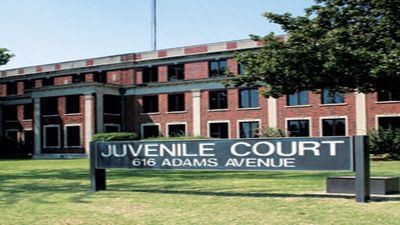
The Shelby County Juvenile Court is getting closer to compliance with the 2012 Department of Justice Memorandum of Agreement, which came about after an investigation into the disproportionate number of black youth who come into contact with the juvenile justice system versus white youth.
Tonight, the third in a series of meetings designed to alert the public as to the court’s progress was held at the Shelby County Schools’ Frances E. Coe Administration building. Juvenile Court attorney Thomas Coupé presented the findings from the monitors over the three areas the court has been ordered to improve upon — due process, equal protection, and protection from harm with regard to the juvenile detention center.
Due process is the constitutional right to know what one is being charged with and the right to fight those charges. It also requires that courts follow legal procedures for the entirety of a case. The monitor found that Shelby County Juvenile Court is in partial or beginning compliance with 54 of 55 standards. Probation counselors are making sure children are being read their Miranda rights, and the probation department has developed a chart to help them make decisions in a race- and gender-neutral way.
But the monitor found that the court needs to be more open to helping with trainings and needs to improve the quality of its panel of attorneys. Although the number of children being transferred to adult court is declining, it’s still higher than the state average.
Equal protection is the constitutional right to being treated no differently by the government than any other person or group. Juvenile court was found to be in partial or beginning compliance with 19 standards for equal protection.
The monitor’s report praised the appointment of Lisa Hill, the coordinator who handles the issue of “disproportionate minority contact,” the issue of more black youth coming into the juvenile system than white youth.
“Each month, we look at the numbers to see if disproportionate minority contact is occurring, and we have to look at what is causing that imbalance,” Hill said.
But the court needs alternatives to detention programs, the monitor’s report said. And they need to work on reducing the number of referrals to juvenile court.
As to the issue of protection from harm in the detention facility, the court was found to be in substantial or partial compliance with all 17 standards. The detention center has revised its use of force policy and has added an around-the-clock nursing presence. There’s also a new policy to ensure that children with suicidal symptoms are seen by a mental health professional within 24 hours.
But there’s a high turnover rate of staff at the detention center, and the monitor suggests that detention needs to continue to monitor and review serious incidents.